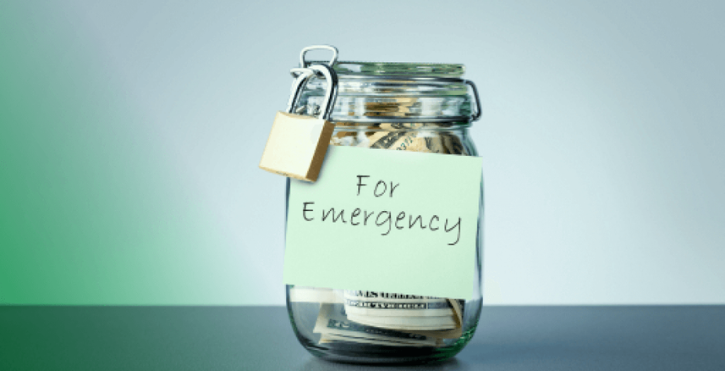
Financial stability is an important part of living a stress-free life. An emergency fund serves as a safety net, keeping you afloat amid unanticipated financial emergencies. In India, where the economy is always changing, having an emergency fund is critical to obtaining financial security. This essay will examine the significance of setting up an emergency fund and present persuasive reasons to do so. So, let’s consider the benefits of using an online savings calculator for building an exigency fund.
Read to understand the advantages of online savings calculator –
∙ Medical exigency
Medical expenses are increasing, and medical worries may hit you at any time. Unanticipated hospitalisation, operations or any treatment may lead to considerable expenses. A contingency fund assures you can manage such expenditures with zero need to depend on any loans, which may further burden your finances.
∙ Unexpected job loss
In the current competitive employment scenario, job security is not assured, and an unanticipated loss of a job might put you in a tough spot financially. An emergency fund serves as a safety net, allowing you to meet critical expenditures such as rent, groceries, and utilities while looking for new career prospects. This financial cushion allows you to avoid incurring debt or depleting your long-term reserves during a period of unemployment.
∙ Natural calamities
India is vulnerable to natural disasters such as floods, earthquakes, and cyclones, which can cause considerable financial damage. An emergency fund can help you cover the costs of repairing or rebuilding your house, replacing destroyed belongings, or making temporary living arrangements without incurring debt.
∙ Vehicle breakdowns
Cars and bicycles may break down unexpectedly, and repairs can be costly. A well-funded emergency account allows you to handle these charges without putting your finances at risk or requiring you to use credit.
∙ Home repairs
Unexpected home repairs, such as repairing a leaking roof, addressing structural damage, or replacing a faulty water heater, can be costly. Having an emergency fund in place helps you to cover these expenses without going into debt or utilising credit cards, which sometimes have high interest rates.
∙ Educational expenditure
Education is becoming increasingly expensive, and unexpected costs such as tuition, books, and extracurricular activities can put a burden on your finances. An emergency fund helps you to support your children’s education without incurring debt or sacrificing other financial priorities.
∙ Supporting elderly parents
As your parents get older, they may need financial help with healthcare, caregiving, and other needs. An emergency fund enables you to give this assistance without jeopardising your financial security or long-term objectives.
∙ Inflation
Inflation reduces the value of your money over time, making it difficult to retain your purchasing power. Having an emergency fund can help you handle rising living costs during periods of high inflation, maintaining your financial security.
∙ Unexpected travel expenditures
Unexpected travel expenses, such as attending a funeral or seeing a sick family member, might strain your finances. An emergency fund guarantees that you can cover these costs without going into debt or spending your resources.
∙ Lower dependency on credit
Having an emergency fund in place allows you to avoid depending on high-interest credit cards or loans during financial emergencies. This helps you avoid financial traps and preserve a good credit score.
∙ Financial independence
An emergency fund allows you to make critical life decisions, such as changing occupations or establishing a business, without concern about the immediate financial ramifications. This financial buffer allows you to take cautious chances and follow your aspirations.
∙ Wedding expenditures
Indian weddings can be expensive, and unforeseen costs may develop. An emergency fund allows you to cover these expenses without incurring debt or jeopardising your long-term financial goals.
∙ Investment possibilities
A well-funded emergency account allows you to capitalise on profitable investment possibilities that demand urgent funds without disrupting your normal savings or long-term investments. Savings plan can help you fulfil this objective.
∙ Stress reduction
Knowing you have an emergency fund may greatly decrease financial stress, resulting in improved mental health and overall well-being. With this sense of security, you may confidently focus on other elements of your life.
∙ Tax savings
Investing your emergency fund in tax-saving instruments such as ELSS or PPF allows you to get tax savings while also protecting your financial future.
∙ Financial discipline
Creating an emergency fund fosters consistent savings, planning, and careful financial management. These practices can improve your overall financial health, allowing you to reach your long-term goals.
∙ Retirement planning
Having an emergency fund ensures that you do not have to dig into your retirement funds during a financial crisis, therefore safeguarding your long-term financial stability.
∙ Mental peace
Knowing you have a financial safety net in place might give you the courage to confront life’s challenges without fear. This sense of stability helps you to concentrate on attaining your objectives, pursuing your hobbies, and enjoying life while knowing that you are prepared to face unforeseen financial obstacles.
∙ Buffer during economic downturns
Economic downturns, such as recessions or poor economic development, can result in job losses, pay reductions, and lower investment returns. Having an emergency fund during these periods can help you retain your financial security and avoid making rash decisions, such as selling long-term investments at a loss. This buffer can provide you with the time and resources you need to change your financial objectives and respond to shifting economic conditions.
∙ Handling legal concerns
Unexpected legal concerns, such as disagreements or litigation, might incur substantial legal bills and expenses. An emergency fund can help you handle these expenses without placing a strain on your usual budget or causing you to go into debt. This cash buffer helps you to concentrate on addressing the legal issue while maintaining your overall financial stability.
∙ Improved credit score
Maintaining a good credit score requires making timely bill payments and avoiding excessive credit utilisation percentages. An emergency fund can help you make timely payments during financial emergencies, keeping your credit score intact. A high credit score will enable you to get loans and credit cards with more favourable conditions and cheaper interest rates in the future.
Conclusion
Creating an emergency fund is critical to obtaining financial security. By utilising a savings calculator and committing to regular savings, you may create a strong emergency fund to assist you handle life’s financial problems. Remember that an emergency fund is not a luxury, but rather a need for a solid financial future. So, start accumulating your emergency cash.






